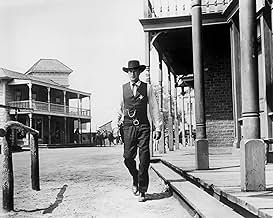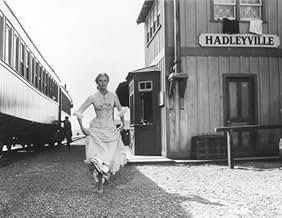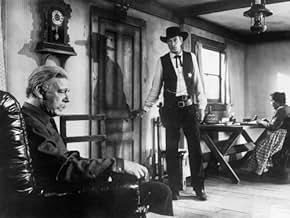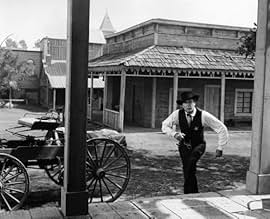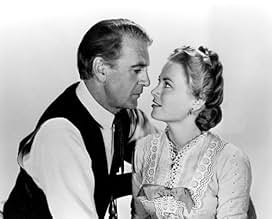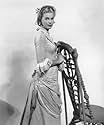Malgré le désaccord de sa jeune mariée et de ses concitoyens, un shérif de campagne doit faire face seul à une bande de meurtriers lorsque leur chef, un bandit condamné autrefois par ses soi... Tout lireMalgré le désaccord de sa jeune mariée et de ses concitoyens, un shérif de campagne doit faire face seul à une bande de meurtriers lorsque leur chef, un bandit condamné autrefois par ses soins, arrive par le train de midi.Malgré le désaccord de sa jeune mariée et de ses concitoyens, un shérif de campagne doit faire face seul à une bande de meurtriers lorsque leur chef, un bandit condamné autrefois par ses soins, arrive par le train de midi.
- Réalisation
- Scénario
- Casting principal
- Récompensé par 4 Oscars
- 18 victoires et 12 nominations au total
- Martin Howe
- (as Lon Chaney)
- Sam Fuller
- (as Henry Morgan)
- Jim Pierce
- (as Robert Wilke)
- Townsman
- (non crédité)
- Church Member
- (non crédité)
Avis à la une
Ably supported by Grace Kelly as his pacifist Quaker wife, who discovers love and right triumphs over long-held preconceptions; Katy Jurado as Kane's former mistress, a fiery Latino type; and Lloyd Bridges as the feisty deputy; Cooper runs away with the acting honours. The theme tune by Tex Ritter is also worthy of note.
High Noon' works because of its tightly written script, its cracking pace and crackling tension. I've seen the film many times and always see something different to notice and admire; still, I'd love to see it again for the first time and not know the twists and turns, not know how it ends. A fabulous film one of the best.
Gary Cooper plays marshal Will Kaine, who turns in his star immediately after he marries Amy, a Quaker girl (Grace Kelly). Upsetting the celebration is the news that killer Frank Miller is due on the noon train and his first order of business is to kill Kaine, a man who Kaine helped send to prison five years ago and swore blood vengeance at the time. The three members of his gang are waiting at the depot. Miller escaped hanging, got a long sentence, and some knuckleheads on the parole board have turned him loose. At first Kaine is with the popular sentiment - Run!. But then he realizes that Miller will lay waste to the town if he isn't there - the new marshal isn't due in until the next day - plus Miller will hunt him down wherever he is - Kaine will always be looking over his shoulder.
He goes around looking for deputies to help him make his stand. Oh, everybody talks about what a good job Kaine did, but nobody stands up for him. They have all kinds of excuses. That a shootout will cause investors from the east and north to think their town is just another shoot em up town, that if Will isn't there Miller will just leave etc. In the end the result is NOBODY stood by him in his hour of need, in spite of the fact that many in the town owed their lives and fortunes to Kaine cleaning up the town.
The best device in this movie - added after a preview called the film dull - is the constant showing of the clock, ticking away the precious minutes Kaine has. And he is a human hero - because you can tell dying is on his mind, running is on his mind, but in the end he stays to face his enemies. The scene towards the end, with him standing in the middle of a dusty abandoned main street as the camera pulls back just to show how alone Kaine is in this battle is iconic.
Where is his wife you might ask? With a ticket in hand to get on the next train out. At least Grace Kelly's character has a reason for her pacifism - her newly found Quaker faith. What she fails to realize is that unless you are willing to be a slave you have to be strong enough that you can afford pacifism.
There are some great performances here. There is Lon Chaney as the old sheriff who Will goes to for help. The old sheriff has the best excuse of all - he is just too old for this. Will would be looking after him instead of himself. Then there is Lloyd Bridges as one of the most unlikeable characters in film history. He's Kane's ex-deputy Harvey Pell and he is a weasel without the cuteness factor. He is tired of living in Kaine's shadow, just a little jealous that Kaine had Harvey's girl before he had her, very resentful that Kaine would not recommend him to be the new marshal. But here is his chance - if Kaine runs, Kaine is no better than he is. That is why he beats Will up trying to put him on a horse towards the end of the film. He doesn't want Will to live, he wants him to run, to somehow prove he is a coward.
And you have to love the townspeople thinking that this will just "all go away" if everybody hides. The first act of the foursome of gunslingers when they hit town is not to kill Kaine, but to smash a store window and take a woman's bonnet that one of the killers fancies - an act of theft. They'll be stealing more than stuff by nightfall if nobody stops them.
Highly recommended.
This is a film that packs a lot of symbolism because of the times when it was done. Those were the days of the communist hysteria where many people in the industry were accused, tried and lost jobs because when they faced the HUAC and Senator Joseph McCarthy.
Gary Cooper plays a man who is decent enough to return to the town where he just has gotten married and has finished his tour of duty. His conscience doesn't let him leave his post as he delays his plans and goes back to defend the town from the bandit who's been freed by Northern judges, and is coming back to seek revenge from Marshal Kane and the town.
Gary Cooper embodied the all Amercian hero. He was an actor who could do no wrong, as he proves in his take of Marshal Kane. We see him as the clock is ticking away toward noon time when the train will arrive in Hadleyville. We see him perspire as he goes around trying to get people help him deal with the problem, to no avail; he will have to do it himself. In the process, he clearly disappoints his new bride, who is horrified at the prospect of losing the man she clearly loves.
Grace Kelly was such an elegant figure that it's hard to imagine she would be in Hadleyville at all! Katy Jurado was also excellent as the jaded Helen Ramirez, the woman who owned a lot of businesses in town. Also effective, Thomas Mitchell, as the mayor of the town and Lloyd Bridges, as Harvey.
This is a film to treasure.
Apparently, this film was intended as an allegory in Hollywood for the failure of Hollywood people to stand up to the House Un-American Activities Committee during the Sen. Joseph McCarthy Red-baiting era. John Wayne actually called the film "un-American", and was still trashing it twenty years later, which is pretty much the highest honor you can receive.
It must have also bothered Howard Hawks, because the "chicken" sheriff led Hawks to make "Rio Bravo", which, surprise, had John Wayne. As an interesting side note, Cooper was conservative, too, but I guess not as much as Wayne or at least not as emotional about it.
The film is called "a western for people who don't like westerns". I can see the point on that, but I do not know how accurate it is. I liked it, and I do not normally like westerns, so I probably should not argue. But I think some westerns are enjoyable by non-western fans, such as "Unforgiven". So "High Noon" is certainly not alone.
I love that the film is in "real time", that its running time is the same length as the actual plot. The only way this could have been better would be to do it with one, continuous shot. However, I suspect they did not have the technology for this, and it would ruin the cinematography. (Hitchkock basically did this with "Rope" with some key edits, but it is much easier when the film happens in a single room.)
Oh, and there is Lloyd Bridges, so young here...
Will Kane is the veteran lawman of Hadleyville, a small Kansas town that used to be the playground of bad men, notorious among them one Frank Miller. "This is just a dirty little village in the middle of nowhere," but Kane cleaned it up. Five years ago he had Frank Miller committed to a distant federal court on a murder charge. Today, as Kane weds his quaker bride, news arrives that Miller is free and heading for Hadleyville. His henchmen gather at the depot, and it becomes clear that Frank will arrive on the midday train, looking to settle scores with the marshall who arrested him. Should Kane leave town with his bride, thus avoiding trouble for himself and for Hadleyville? Or should he stay and face the Miller gang? Will the citizens rally round their marshall?
John Wayne famously criticised the film for being 'unAmerican', in that (in his view) a frontier community would not desert its lawman so abjectly. Implicit in Wayne's malediction is the notion that mainstream movies should promote wholesome patriotic values - a notion that led in Wayne's case to the debacle of "The Green Berets". Zinneman's acclaimed film probes the ugly side of human nature, "sifting out the hearts of men".
Zinneman and Director of Photography Floyd Crosby devoted a lot of care to the look of the film, effort that paid off handsomely. From our first view of Lee Van Cleef as an ominous shadow on the horizon to the climactic cuts which seem to accelerate the arrival of the fateful train, this is a movie which speaks through images. The arid, flat expanses of Kansas mirror the impassive sky, and the town's rickety structures seem puny against the bleak magnificence of nature. Human wishes are vain in the face of Fate. Rail tracks extend with cruel exactitude into the distance, converging in perspective upon the vanishing point, the symbolic spot whence Frank Miller will materialise. Lurking in the depot's shade, the dark presence which is the Miller Gang bristles with malice.
Zinneman is not afraid of extreme close-ups, which he uses to reinforce moments of emotional power (Kane realising that he has no support, Helen refusing to beg). He shoots Kane predominantly from below waist height, stressing his tall, erect stance as a symbol of moral authority. Compositions are tight and attractive throughout.
Gary Cooper was fifty-one years old and quite ill when "High Noon" was shot. He is, in truth, too old for the part. Gregory Peck had turned it down, and it is fascinating to imagine Peck as Kane. There is no rapport whatsoever between Cooper and Grace Kelly, and they make unconvincing newly-weds. "I won't be there when it's over," says the blushing bride, and though the script tries valiantly to give Amy a motivation (she became a quaker after seeing her menfolk gunned down), the abiding impression is of Kelly's prissy coldness.
"High Noon" is, for an action western, surprisingly strong on character. The judge (Otto Kruger) is clear-headed about running away from the Millers, and argues his position powerfully, yet his authority is punctured by his actions as he speaks - lowering the Old Glory, and concealing the scales of justice. Lloyd Bridges is excellent as Harvey, the deputy whose moral vision is clouded by lust for Helen and immature resentment of Kane. Katy Jurado never looked lovelier than here, playing the fallen woman Helen Ramirez who loved and lost Kane - and loves him still. A young Harry Morgan is Sam Fuller, the self-important coward who cannot face Kane. Marshall Howe (Lon Chaney Jr.) is the retired lawman who is now embittered and counsels Kane against throwing his life away for the sake of these undeserving citizens - "They just don't care!" In a cameo of pivotal importance that must have been great fun to play, Howland Chamberlain is the bitchy hotel desk clerk who hits Amy with a few home truths. James Millican is Herb, the dependable deputy who vacillates when the chips are down, and Jack Elam makes a fleeting appearance as the town drunk who sleeps through the entire drama.
One interesting plot development is the strange alliance which forms between Kane's two women. They meet in Helen's hotel room and decide to leave town together. Significantly, as they ride past Kane in the buggy, it is Helen who looks back, not Amy.
It has been suggested that "High Noon" obeys Aristotle's three unities, especially that of time, the depicted events being capable of fitting into the film's ninety-minute span. Clocks are everywhere in Hadleyville, and the passing of the minutes is constantly emphasised. My only observation is, it remains ten minutes to twelve for an unconscionably long time.
"The day cometh that shall burn like an oven," we are informed, and I for one found the film's climax rather disappointing after the intense build-up. "It's our problem because this is our town," declares a local worthy, but neither he nor anyone does anything about it. Zinneman's great crane shot, about halfway through the film, speaks more eloquently than the hollow words, zooming back to show a silent, friendless street, and one upright man, utterly alone.
Le saviez-vous
- AnecdotesIn 1951, after 25 years in show business, Gary Cooper's professional reputation was in decline, and he was dropped from the "Motion Picture Herald's" list of the top-ten box-office performers. In the following year, he made a big comeback, at the age of 51, with this film.
- GaffesIn a number of scenes there are Pabst Brewing signs seen on the inside and outside walls of the saloon. Although Pabst did brew in 1848, it did so under the name Best and Company and did not change to Pabst until 1889; the 37-star flag suggests the setting dates are between 1867-77.
- Citations
Helen Ramírez: You're a good-looking boy: you've big, broad shoulders. But he's a man. And it takes more than big, broad shoulders to make a man.
- ConnexionsEdited into Darkness at High Noon: The Carl Foreman Documents (2002)
- Bandes originalesHigh Noon (Do Not Forsake Me, Oh My Darlin')
Music by Dimitri Tiomkin
Lyrics by Ned Washington
Performed by Tex Ritter
[Played over the opening title card and credits; excerpts played throughout the movie]
Meilleurs choix
Détails
- Date de sortie
- Pays d’origine
- Langues
- Aussi connu sous le nom de
- Quand le train sifflera trois fois
- Lieux de tournage
- Société de production
- Voir plus de crédits d'entreprise sur IMDbPro
Box-office
- Budget
- 730 000 $US (estimé)
- Montant brut mondial
- 217 $US
- Durée
- 1h 25min(85 min)
- Couleur
- Rapport de forme
- 1.37 : 1




